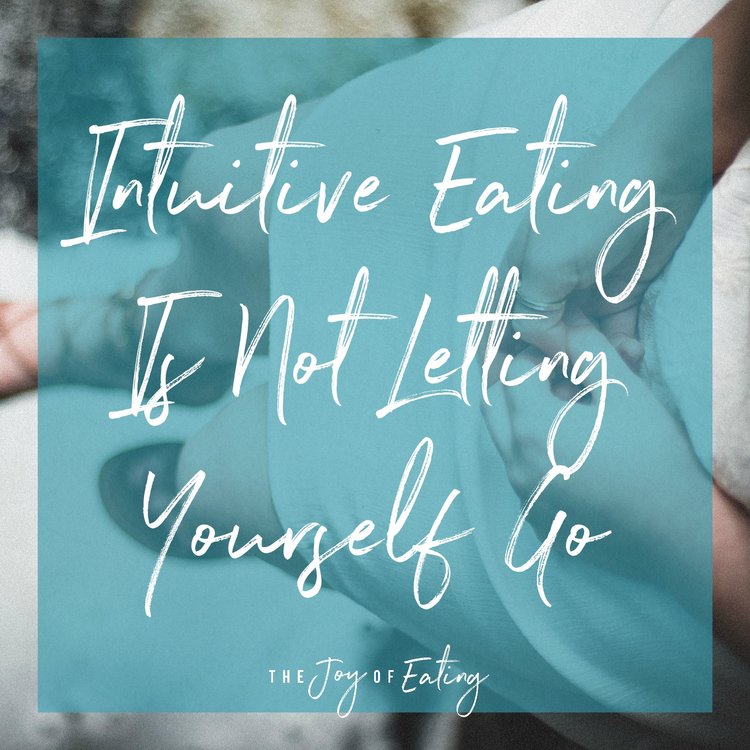Why How You Feel Is More Important Than What You Weigh
This article was originally posted in May of 2015. Images and text have been updated.
Most of my clients have spent years, decades even, on the roller coaster ride that is dieting. They're exhausted, stressed, depleted and feel like a failure. They know there's got to be a better way, but don't know what that looks like.
By some twist of fate, they end up with me, the non-diet dietitian. All of sudden, they've got someone encouraging them to honor their hunger, stop calorie counting, and eat foods that make them happy. Someone who is more concerned with how they feel, than how much they weigh. It's relieving, empowering, refreshing...and absolutely terrifying.
They want to have a healthy, balanced and sane relationship with food. They want to eat foods they enjoy without obsessing about it. They want to feel confident, or at the very least, at home in their body. They know from personal experience that dieting doesn't work, but that doesn't make their weight concerns go away. Even though they know logically that weight loss isn't the answer, frankly, they still want to lose weight.
Sound familiar?
It's totally understandable. We're constantly surrounded by diet culture, which tells us we're more valuable if our body is smaller. Diet culture tells us life will be rainbows and butterflies in our new smaller body. We either see the way diet culture stigmatizes people in bigger bodies, or experience that stigma ourself. It's no wonder so many people want to lose weight. But the problem is diet culture, not your weight.
Clients often want to know if it's possible to sustainably lose weight without, well, trying to lose weight. They want to know if they drop the diets, can they lifestyle change and self love themselves into a smaller body.
It's a really complicated question, so I'll do my best to answer.
Most people (or at least my clients and blog readers) have heard the statistics that 95-97% of diets fail. Or, they have their personal experience that diets don't work. That part isn't surprising.
When most people hear the phrase "diet" they think either fad diet, like the grapefruit diet, or organized system for weight loss, like Weight Watchers. In actuality, a diet is any purposeful attempt at weight loss. Yes, even "clean eating" or "healthy lifestyle changes," that is, if weight loss is your goal.
That's because trying to lose weight immediately triggers something inside the brain that puts any seemingly positive change into a negative light. Wanting to lose weight changes the motivation from self care, to punishment and restriction. And as we know, restriction always always leads to overconsumption.
Despite what the charts at your doctor's office tell you, there's no solid way to know what your weight "should" be. And there's no way to get your body to permanently stay smaller than it's natural size without engaging in some seriously disordered behaviors.
So instead of shooting for a number on the scale, why not set a goal of feeling good, and let your body settle wherever it's meant to be? How you feel is much more important than what you weight.
Keeping up with a list of "good" and "bad" foods on a diet is stressful. Instead, why not pay attention to how food makes you feel? You'll naturally gravitate towards an eating pattern that includes variety, balance, and plenty of plants.
Sticking to an exercise regimen is stressful. Instead, why not pay attention to how movement makes you feel? While hanging out on the couch all day feels good on occasion, it doesn't feel good all the time. Your body will crave movement, maybe something light, like restorative yoga, or something more vigorous, like a heart pumping workout class. By listening to your body with the goal of feeling good, you'll naturally find yourself moving your body pretty regularly, in ways that are actually enjoyable.
Watching the scale is stressful. It isn't very accurate. It fluctuates throughout the day, often times seemingly for no reason. I remember this experiment a dietitian friend of mine did where she weighed herself every waking hour to show how unreliable the scale is - her weight fluctuated 8 lbs over the course of the day, even though it was a very normal day of eating and movement. Imagine just how often those natural fluctuations camouflage or create "results" for someone who using the scale to measure progress. Instead, why not focus on how you feel about your body, by fostering body respect and acceptance.
As you're taking better care of your body, it will settle at the size that's right for you, which may be less than, the same, or if you're weight suppressed, higher than the size you're at today. That may sound traumatic if your brain is in diet mode, but if you have a solid base of body acceptance, you'll know that your body is where it's supposed to be. But, to get to this natural weight, whatever it might be, you have to put weight concerns on the back burner. The goal has to be feeling good, physically and mentally, not looking "good."
My goal as a dietitian is to help my clients feel good, not to hit some arbitrary number on the scale. If you need guidance in reprioritizing health over a number, contact me, and I'll be happy to set up a free 15 minute phone consult to see if we're a good fit to work together.
More inspiration for diet-free living:





